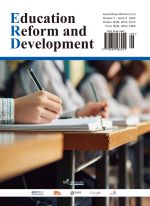Practice of Progressive Ideological and Political Reform in Experimental Courses under the Background of “New Engineering”: A Case Study of An Engineering Finite Element Course
Abstract
Under the background of “comprehensive ideological and political education”, experimental teaching, as an important link connecting theory and practice in new engineering majors, plays an irreplaceable role in professional education and the construction of ideological and political elements in courses. Taking “Engineering Finite Element and Numerical Calculation,” a core course for undergraduates majoring in mechanical engineering, as an example, this paper focuses on the course training objectives and the fundamental task of fostering virtue through education. It organically integrates theoretical knowledge, practical engineering problems, cutting-edge technological development and ideological and political elements, and constructs a reform of the “learning-practice-research” progressive ideological and political teaching mode in experimental courses. The reform of the “combination of learning and thinking” experimental teaching mode integrates value guidance into knowledge imparting; the design of the “integration of practice and thinking” experimental links cultivates students’ engineering practice ability while enhancing their sense of engineering ethics and professional responsibility; the reform of the “integration of research and thinking” experimental content guides students to be brave in innovation and continuous exploration through scientific research project training. Through the analysis of the achievement degree of course and ideological and political objectives, as well as teaching evaluation, the effectiveness of the teaching reform is verified, which provides a referential implementation path and practical experience for the construction of ideological and political elements in “new engineering” experimental courses.
References
Wang M, Wang J, Wang M, et al., 2023, Exploration and Practice of Curriculum Ideology and Politics in AutoCAD Mechanical Drawing Skill Training. Modern Business and Trade Industry, 44(24): 255–257.
Sun M, Guo J, Xie Z, 2023, Mining and Practice of Ideological and Political Elements in Mechanical CAD/CAM Course under the Background of New Engineering. China Educational Technology & Equipment, 1(24): 94–96.
Li X, Luo F, 2025, The Influence of Teacher Curriculum Leadership on the Implementation Effectiveness of Curriculum Ideological and Political Education. International Educational Research, 8(2): 141.
Wu Y, Wang F, Liu Y, 2024, Exploration on the Theoretical and Practical Path of Ideological and Political Construction in Experimental Teaching under the “Great Ideological and Political” Pattern. Heilongjiang Education (Theory and Practice), 1(2): 69–72.
Long Z, Chen X, Dong B, 2023, Research and Exploration on Integrating Ideological and Political Education into the Experimental Teaching System of Engineering Mathematics. Research and Exploration in Laboratory, 42(11): 216–219.
Zhang X, Luo X, Zhang X, 2023, Research and Practice on Integrating the “Multi-line Co-learning” Curriculum Ideology and Politics Model into Electrical and Electronic Experiments. Research and Exploration in Laboratory, 42(10): 220–224.
Wang J, Liu S, Guo X, et al., 2021, Construction of a Trinity Experimental Teaching System of Theory-Experiment-Ideology and Politics in Pathophysiology. Research and Exploration in Laboratory, 40(10): 206–209.
Yin F, Zhu S, He Y, et al., 2023, Research and Practical Exploration of “Three-module Spiral Progression” Ideological and Political Education – Taking the Course “Finite Element Method and Software Application” as an Example. Journal of Changzhou Institute of Technology, 36(5): 95–99.
Chen Y, Lin F, Wang L, et al., 2023, Research and Exploration on the Integration of Curriculum Ideology and Politics with Professional Practice Teaching. Laboratory Science, 26(6): 192–196.
Yi L, Kang L, Yang B, 2023, Exploration and Practice of Curriculum Ideology and Politics in Mechanical Precision Experimental Teaching. Laboratory Science, 26(6): 201–205.
Huang H, Zou J, Hua X, 2022, Exploration and Practice of Curriculum Ideology and Politics Teaching in Digital Topographic Surveying under the Background of Intelligent Surveying and Mapping. Bulletin of Surveying and Mapping, (S1): 33–36 + 68.
Huang B, Cui X, 2020, Discussion on Undergraduate Teaching Reform of “Fundamentals of Finite Elements” Driven by Engineering Applications. Science & Technology Information, 18(21): 107–108.
Qin Y, Guo Z, Yuan C, et al., 2024, Exploration on the Integration of Curriculum Ideological and Political Elements into the Teaching Reform of Engineering Survey Course. Journal of Higher Education, 10(2): 185–188. DOI: 10.19980/j.CN23-1593/G4.2024.02.044.
Gu J, Su L, Jiang Y, et al., 2021, Exploration and Practice of Finite Element Course Teaching for Mechanical Major. Science & Technology Vision, 11(14): 42–43.
Liu Y, Zhao Y, Xi F, et al., 2019, Research on the Current Situation and Reform Methods of Finite Element Method Course Teaching. China Educational Technology & Equipment, (18): 71–73.
An Engineering-Problem-Based Short Experiment Project on Finite Element Method for Undergraduate Students, 2020, Education Sciences, 10(2): 45.

